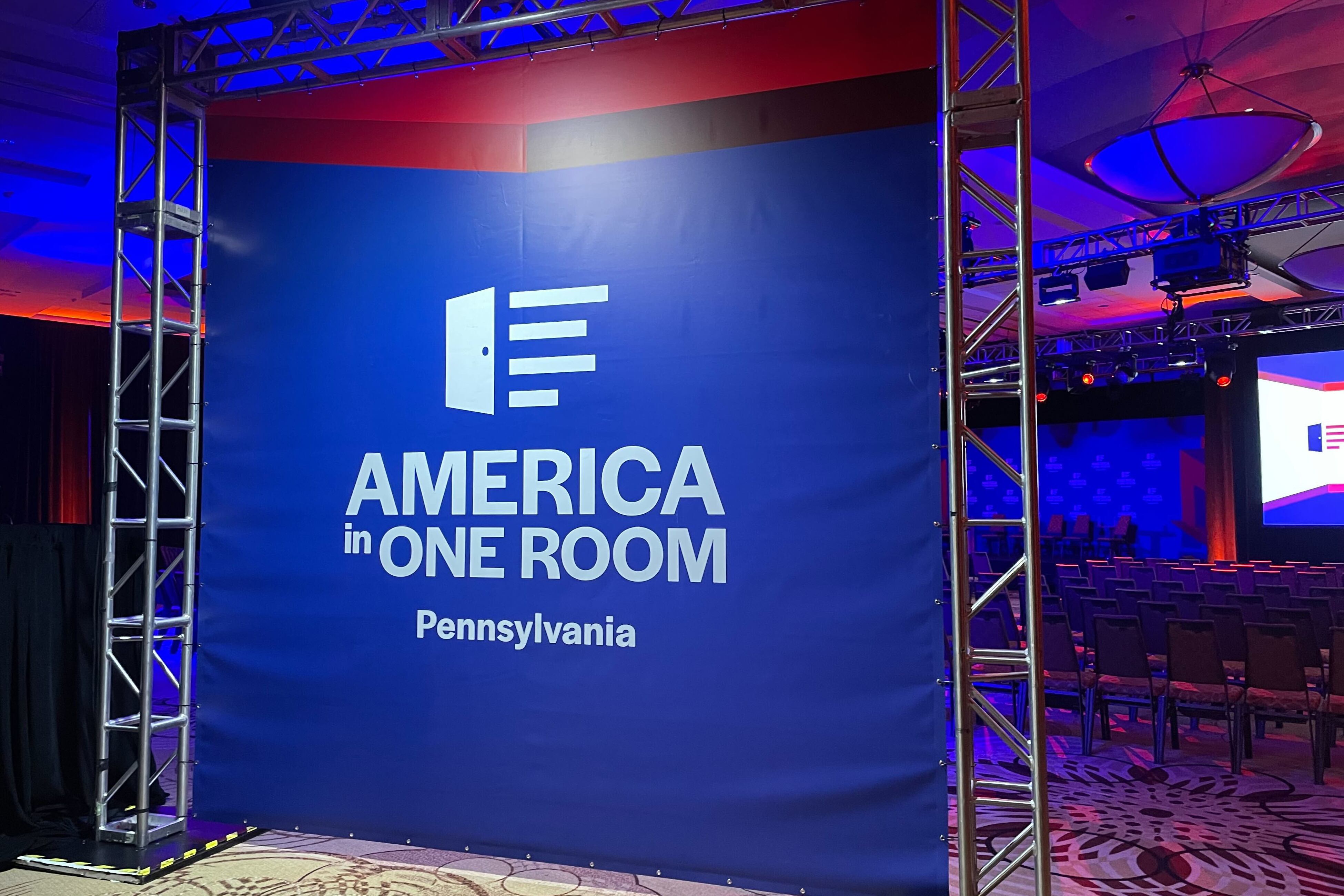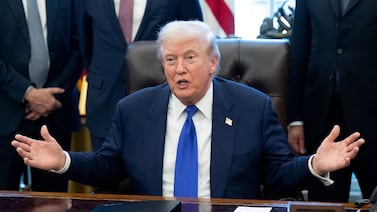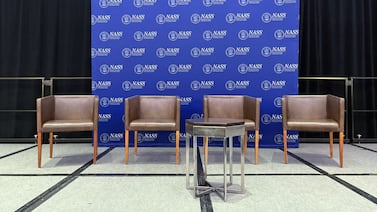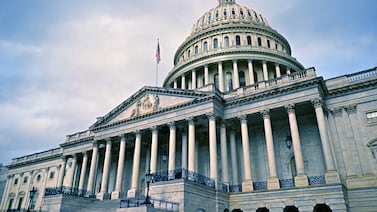Votebeat is a nonprofit news organization reporting on voting access and election administration across the U.S. Sign up for Votebeat Pennsylvania’s free newsletter here.
After years of fruitless debate in Pennsylvania’s legislature about whether and how to update the commonwealth’s election laws, a civics project is trying to see whether ordinary voters have better luck reaching a consensus on issues such as early voting and voter ID.
Nearly 200 Pennsylvanians gave it a shot last weekend in an effort organized by Stanford University’s Deliberative Democracy Lab and Helena, a nonprofit that describes itself as a “global problem solving organization.”
The discussions among the participants, gathered in small groups at a Sheraton Hotel in Philadelphia, spotlighted the way ordinary voters process the issues that fuel political rhetoric, legislative debates, and court battles.
In one exchange, William Sontag, a participant from Chester County, said he was “baffled” about what the argument against new voter ID requirements might be.
Sarah Dewey, from Bucks County, told him about a friend who had been homeless for a time, with no identification. Dewey said she wasn’t necessarily against voter ID, but worried that the cost of obtaining it could be prohibitive.
After about 15 minutes of discussion, the group coalesced around the idea that requiring an ID to vote would be acceptable, so long as there were no barriers to getting one. They also decided to ask an expert panel later that day whether the cost of getting an ID could be considered a poll tax.
Assessing the will of the people through a ‘deliberative poll’
Sontag, Dewey, and the rest of the participants got involved in the project after the organizers randomly selected them from across Pennsylvania, using a method meant to proportionally represent the state’s geographic regions, as well as demographic and political characteristics, such as age, race, education, and political leaning. Participants were paid for their time.
Focusing on a single state’s policies was a novel approach for the American in One Room project, a collaborative effort between the Deliberative Democracy Lab and Helena which have organized four similar nationally focused events since 2019.
This type of event is called a “deliberative poll.” Participants are provided with relevant information on the issues and access to policy experts. They also take a survey meant to gauge their opinions both before and after the event, to see how the deliberation affected their policy preferences. A control group of residents who aren’t participating in the deliberations also take the poll as a basis for comparison.
The idea is to “get a better assessment of the will of the people,” said James Fishkin, a communications and political science professor at Stanford and director of the Deliberative Democracy Lab.
Besides elections, participants in the Pennsylvania event talked about healthcare, immigration, and housing, among other topics. Many of the election topics mirrored proposals currently being debated in Harrisburg as part of an omnibus voting reform package sponsored by state House Speaker Joanna McClinton, a Philadelphia Democrat, who answered participants’ questions on election issues on the third day.
Fishkin said deliberative polling can prompt policy changes, as it did during consideration of constitutional changes in Mongolia in 2019 — a process that Stanford was also involved with. Deliberative polling also played a role in energy policy debates in Texas, after the Legislature there ordered it as part of its planning process.
A Helena representative said McClinton will use the results of its Pennsylvania poll to inform her priorities in ongoing negotiations with the state Senate over sweeping election legislation that passed the state House last month.
Weighing difficult policy questions, tradeoffs
Participants wrestled with a list of thorny election policy questions, including whether to install video cameras to monitor ballot drop boxes; audit a random sample of ballots to check the accuracy of election results; implement in-person early voting; allow counties to begin processing mail ballots ahead of Election Day; create criminal penalties for misleading, deceiving, or intimidating voters; preregister voters at age 16; and require photo identification to vote.
Many of those policies are part of McClinton’s election bill, which organizers said they used to select the topics for discussion.
In the group discussion observed by Votebeat and Spotlight PA, participants reached agreement on many of the questions posed to them, but it’s hard to know if they had all the information.
For instance, participants were assigned to consider whether Pennsylvania should allow 11 days of early voting, as McClinton’s bill proposes. The briefing document listed increased accessibility as an argument for the proposal, and increased cost as an argument against, among other pros and cons.
One factor they didn’t consider: that the state’s current version of quasi-early voting — in which voters can apply for, complete, and return a mail ballot in person at an elections office — has prompted long lines and confusion. Pennsylvania election officials said they expect that to be an issue for them and for voters in the 2026 and 2028 federal elections.
Instead, the participants in that group looked at early voting only from a redundancy standpoint.
“If mail-in ballots remain, then I don’t see a need for this,” Dewey, from Bucks County, said.
Others in the room agreed with her. Roy Bell, a poll worker from Delaware County, cited the cost of adding personnel for early voting, and election officials’ difficulties in enough poll workers.
Errors in the briefing materials
In addition, the briefing materials provided to participants were not entirely accurate.
For example, the section on pre-canvassing mail ballots said Pennsylvania “currently permits election officials to begin processing mail-in and absentee ballots ahead of time but restricts how early this can start.” Pennsylvania’s election code does not allow any pre-canvassing — the technical term for this process — of mail ballots before Election Day.
It also said that an argument against allowing pre-canvassing is that it “could increase wait times before results.” It’s actually the opposite: Election officials say allowing pre-canvassing would speed up results.
Other portions of the briefing were accurate but incomplete, such as a section on post-election audits that did not mention that Pennsylvania already requires two such audits. Some of the citations in the report also included broken links.
Votebeat and Spotlight PA used GPTzero, a tool that detects whether text is generated using artificial intelligence, to see whether any of the election portions of the briefing had been written by AI. The tool found that for many of the sections on election issues between 80% and 100% of the text was AI-generated.
WITF, an NPR affiliate in Harrisburg, also found errors in other areas of the document.
A spokesperson for the Deliberative Democracy Lab said the briefing materials were developed by research assistants and incorporated materials from previous events. An advisory committee — only one member of which was from Pennsylvania — reviewed the materials, and AI was used to help address recommendations and simplify the language to “an 8th-grade reading level, reflecting the average level of a US adult,” the spokesperson said in an email response to questions.
Some information, including the currently required audits, was excluded so as not to overwhelm the participants, the spokesperson said.
Organizers said they were confident in the integrity of the deliberations, and would note any errors in their final results. Due to the error in the pre-canvassing pros and cons list flagged by Votebeat and Spotlight PA, the Deliberative Democracy Lab said data from that proposal would be excluded.
“These errors appear to have been introduced during an editing and review process of human-created material in which some AI tools were used to assist,” Fishkin said.
“We apologize for these errors and are reviewing our processes to ensure that such issues do not occur in the future,” Fishkin said. “We are, however, confident that in totality, the materials provided to participants were reliable and allowed for a fact-based civil dialogue, which is at the heart of the Deliberative Polling process.”
Carter Walker is a reporter for Votebeat in partnership with Spotlight PA. Contact Carter at cwalker@votebeat.org.




